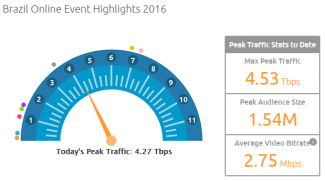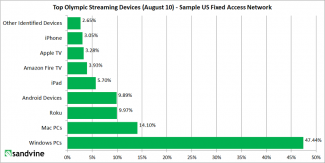As NBC Sports battles so-so television ratings for its coverage of the 2016 Summer Games, online video streaming of the Olympics is also seeing lower traffic peaks than those of other recent sporting events.
Akamai’s measurement of streaming traffic over its CDNs show that the Games so far have seen maximum peak traffic of 4.53 Tbps -- about a terabit higher than the 3.5 Tbps peak for the Sochi Winter Games in 2014, but well below the all-time high of 7.3 Tbps recorded during the recent Euro Cup final.

The highest traffic rates have been recorded in Europe, with the continent grabbing about 56 percent of online traffic during the Games so far. The Americas are running a distant second with 39 percent of traffic.
So far, the women’s team gymnastics event on Aug. 9 has garnered the highest single-event peaks, according to Akamai’s traffic monitor.
Those are still record numbers for online streaming of the Olympics, especially when compared with the numbers coming from Nielsen around viewing of NBC’s broadcast of the Games. NBC recorded 27.8 million viewers through the first 10 nights of the Rio Games, down 17 percent compared to the 2012 London Games, the Los Angeles Times reported.
“Looking at the decrease in TV viewing between Q1 2015 and 2016, the decline in Olympics TV viewing seems extreme,” said analyst Colin Dixon of nScreenMedia in a post detailing the dropoff in ratings.
Dixon posited that availability of all the Olympic events online, via NBC’s TV Everywhere app, as well as the increased penetration of streaming devices, especially connected TVs, means that more Americans are watching the Games online rather than via traditional broadcast.
Still, it will be quite awhile before online streaming audience size even comes close to the size of the traditional television audience. Last week, Sandvine reported that early Olympics streaming didn’t make much of a dent in U.S. network traffic, taking at most 1.5 percent of all traffic on the sample network it monitored. Twitch generated more streaming bandwidth in the same period than the Games did, for example.

Sandvine noted in a later post that Windows PCs are by far the most popular devices being used to stream the Games, accounting for 47.4 percent of traffic. Roku devices, by comparison, accounted for just under 10 percent of streaming traffic during the Olympics.
The lower but steady streaming numbers are typical for an event stretching over several days, Akamai CTO of Media Business John Bishop noted, pointing out that streaming volume has been significant -- triple the volume of London 2012 and double that of Sochi in 2014.
"This is indicative of the nature of the tournament," said Bishop in an e-mail to FierceOnlineVideo. "Whereas a World Cup or Euro traffic peak is primarily driven by one or two big matches taking place at once and within a fairly small window of time, we could be delivering upwards of 60 concurrent feeds at any given time during the Olympics. In terms of visualizing traffic patterns, it’s similar to comparing the Rockies to the Appalachian Mountains: dramatic peaks versus steady, rolling hills."
For more:
- see this L.A. Times article
- see Akamai’s Olympics page
- see this nScreenMedia post
- see this Sandvine post
- and this post
Related articles:
Comcast/NBCU see huge 35% drop in Olympics Opening Ceremony ratings
Akamai sees new streaming record of 7.3 Tbps during Euro 2016 championship
Akamai, Microsoft lead Olympics streaming support for NBC Sports